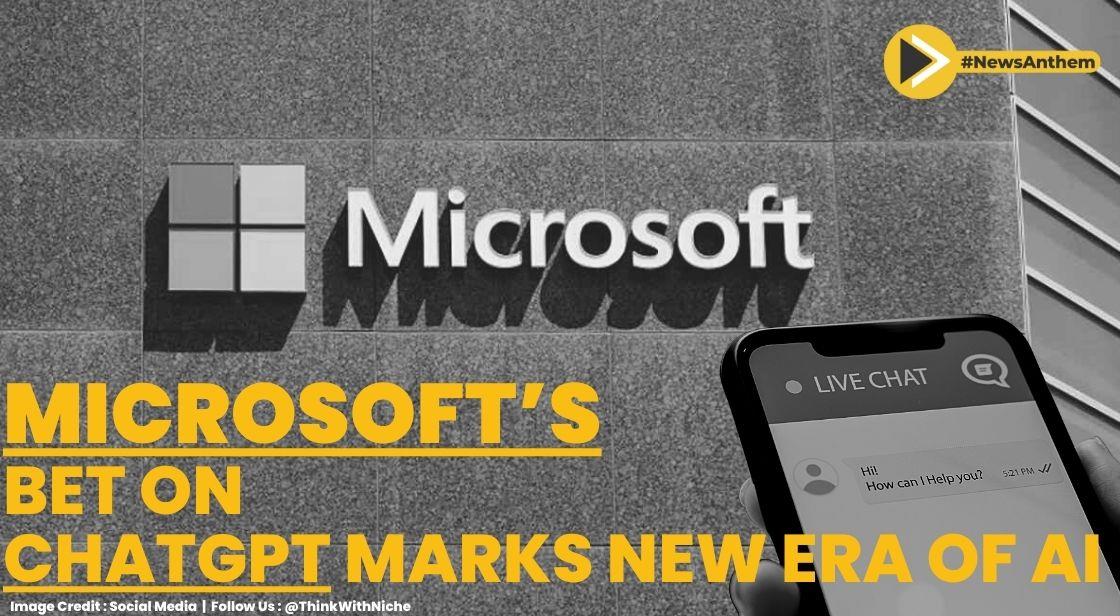Microsoft's $10 Billion Investment In ChatGPT Developer Opens A New Era Of AI

News Synopsis
Microsoft's proposed $10 billion investment in San Francisco-based research company OpenAir appears to be the key move that will usher in a new era of artificial intelligence. If the US software giant is correct about the technology's broad implications, it might also lead to a realignment in the AI industry as other tech companies compete for a position in the emerging field of generative AI.
With the launch of ChatGPT, an AI system that can respond to questions and generate text in natural-sounding language, OpenAI made headlines around the world last month. However, Microsoft officials are certain that the service's underlying technology will eventually have a greater impact on the tech industry as a whole. The way humans engage with computers will alter as a result of these [AI] models, according to Eric Boyd, Microsoft's head of AI platforms. “These [AI] models are going to change the way that people interact with computers,”,Boyd stated in an interview with a news agency prior to the announcement of the potential deal, “They understand your intent in a way that hasn’t been possible before and can translate that to computer actions,” he added.
Two persons with knowledge of the matter confirmed that Microsoft's proposed investment, first reported by the newsletter Semafor last week, would involve taking a sizeable minority position in OpenAI, valuing it at $29 billion following the investment. Microsoft opted not to respond. At a time when earlier investment fads like blockchain and cryptocurrency have fizzled, venture capitalists are rushing to support the most recent AI boom, which might be a historic investment.
In 2019, Microsoft invested its first $1 billion in OpenAI, securing a position as the technological foundation for the company's extremely demanding AI models and granting it exclusive rights to commercialize its technology. The software behemoth has already incorporated OpenAI's technology into a number of its own products, but according to its executives, this is just the beginning of what is to come.
Since 2021, its cloud users have been able to pay for access to GPT-3, an AI model that generates text. Dall-E 2 is the backbone of a recent Microsoft visual design tool called Designer, which is also accessible through the Bing search engine. Dall-E 2 is a part of a wave of picture-generating systems that rocked the AI world last year. Meanwhile, GitHub, a Microsoft site for developers, has transformed Codex, a system that suggests which lines of code to write next to software engineers, into a product.
According to AI specialists, the rate at which products like these are transitioning from cutting-edge research to common use in technology may be unmatched in history. Only in the middle of 2021 was Codex first mentioned in an OpenAI research paper; nevertheless, a year later, Microsoft transformed it into a for-profit membership business. According to Thomas Dohmke, CEO of GitHub, 40% of the code created by developers using the Copilot service is automatically generated by the AI system, cutting the time it takes to create new code in half.
This represents a significant improvement after a decade of largely unsuccessful efforts to increase developer productivity. It's a staggering productivity statistic, according to Dohmke. So-called massive language models, which are developed by OpenAI and trained on enormous amounts of text, are the foundation of most of its technology. Contrary to earlier iterations of machine learning, which have dominated artificial intelligence for the past ten years, the method has produced systems that can be applied in a wider range of situations, increasing their commercial worth.
You May Like









